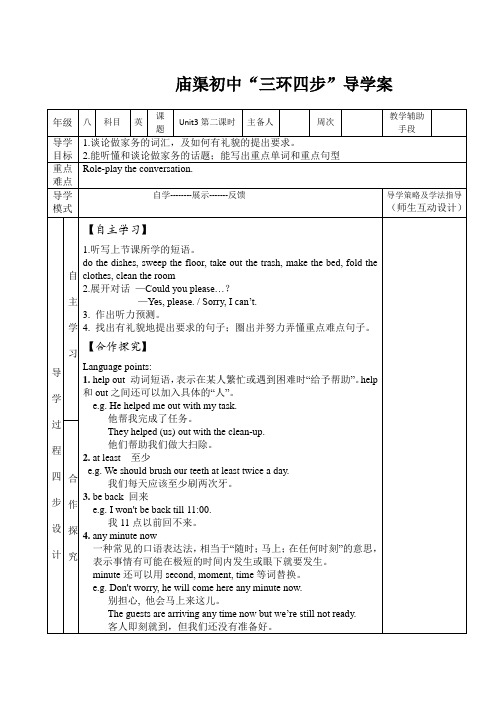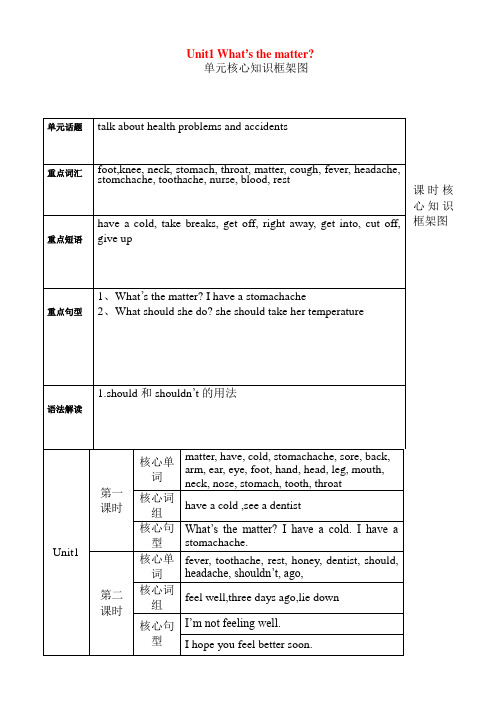八年级英语下第2课时导学案
人教版八年级英语下册unit3第二课时导学案

【反馈检测】
一.根据汉语提示完成英语句子。
1.She is(叠衣服) now.
2.I don’t hate(倒垃圾). It’s fun.
3.Miss Kang often(打扫起居室)at weekends.
4.Mr. Wang likes to helps his wife(洗衣服).
导学策略及学法指导(师生互动设计)
反
馈
检
测
教
后
反
思
5.Lucy’s mother asks her(整理床铺)by herself after she gets up in the morning.
二.用所给单词的适当形式填空。
st week everyone was trying(cheer) up Jimmy.
2.He now has 16 bikes(fix) up.
2c Make conversations using the information in 2a and 2b
A: Could I use your computer?
B: Sorry. I’m going to work on it now.
A: Well, could I watch TV?
B: Yes, you can. But first you have to clean your room?
别担心,他会马上来这儿。
The guests are arriving any time now but we’re still not ready.
客人即刻就到,但我们还没有准备好。
We’re expecting them any moment now.
人教版八年级英语下册unit2 第二课时学案

Unit 2 what time do you go to school?Section A (2a-2d) (第2课时)学案【学习目标】:1.熟练掌握本课的单词,和部分短语: never, early, fifty, job, work, station, radio station, o’clock, night, funny, exercise。
2.熟练运用句型询问时间,以及在某个时间干什么事What's the time? It's...What time do you usually...? I usually ...at...When does Scott go to work? -- He always goes to work at eleven o’clock.【学习重点】:学会运用what time 和 when 引导的特殊疑问句,描述自己或他人的日常作息活动。
【学习过程】:一自主学习学习任务一:1.个人自读本节单词和短语并记忆.2.小组互相检查读、写情况.学习任务二:讨论2c部分1. 练习下列对话 What's the time? It's seven--thirty.What time do you usually go to bed? I usually go to bed at eight o'clock.2.两人一组练习对话3. 交流展示学习任务三: 阅读2d的对话,能描述出斯特科的这一天的活动1.个人自读2d的短文,划出文中的短语。
2.小组讨论文中的汉语意思。
3.复述对话,试着模仿说出自己的一天的活动。
二合作共建1.完成听力练习2a,2b.2.用以下句型谈论自己的日常生活。
e.g. A: What time do you usually get up? B: I always get up at five fifty. A:Wow! I never get up so early.3.学习2d1).阅读对话,回答以下问题:a. Where does Scott work?________________________________________________________________________.b. When does he go to work?________________________________________________________________________.c. What time does he exerci se?________________________________________________________________________.2).根据录音机跟读对话,然后小组内分角色朗读和表演对话。
人教版英语八年级下册 Unit 3 Section A 3a-3c 导学案

Unit 3 Could you please clean your room?Section A(3a-3c)第二课时【学习目标】1可以准确说出并默写本课重点生词、短语。
2.能提升精读文篇的能力, 尤其是根据上下文猜测与同义替换的能力。
3.倡导帮父母做家务,互相分担责任,快乐生活。
【学习重难点】理解重点单词、短语以及针对重点句型的分析。
通过文篇精读学习,掌握阅读技巧以及进行文篇结构的分析,情感的提升。
【学法指导】研读课本第19页及第116页单词表对应部分,根据导学案上的要求完成【自主学习】、【整体建构】、【小试牛刀】和【我的困惑】部分。
【自主学习】学习活动一:基础知识大联盟任务一:请自主预习单词和短语,根据句意写出单词或者短语。
1)Don’t _________(扔) the rubbish everywhere.2)My mother bought me a new _________(衬衣) yesterday.3)___________(两个都不) of us did the housework.4)His brother watched TV ___________________(一直) and never helped out.5)My father came over ____________________(一…就) I sat down in front of the TV.任务二:自主阅读精读3a文篇,完成选择题。
1.What is the best title of the passage? ( )A.Share the houseworkB. Take the dog for a walkC. People don’t like doing the houseworkD. Nancy’s mom is angry with her2.Why did the dog welcome me when I came home? ( )A.He wanted to play with me.B. He wanted me to feed him.C. He wanted a walk.D. He liked me very much.3.What did I want to do first? ( )A. Watch TVB. Do my homeworkC. Play with the dogD. Do the housework4. What did mom want me to do?( )A. Do my homeworkB. Take the dog for a walkC. Watch one show firstD. Help her do some washing5. Who cleaned the house at last? ( ) A. I B. My mom C. My dad D. We don’t know 任务四:继续精读3a,尝试翻译长句汉语以及重点语法点拨。
外研版初二英语下册Module2 导学案

外研版初二英语下册Module2 Friendship导学案Module 2 Friendship预习学案一预习目标:1.预习并掌握以下单词动词及词组:hold, hold the line, feel like, be afraid to do, make friends with, laugh, worry, worry about, pass, touch, matter, believe 名词:friendship, classmate, relation, foreigner, gift其他词组:right now, in fact, a couple of, far away, at the moment, by the way, day by day2.预习并初步掌握电话用语。
3.能够从一篇短文或故事中找出五个wh-: who, what, when, where, why。
二预习重点:1.重点词组的用法:feel like与would like区别,afraid的用法。
2.电话用语的特点。
3.通过阅读掌握故事的阅读方式,掌握故事阅读中的五个wh-问题,从而掌握故事的线索。
三预习方法:自主互助讨论法,教师指导法。
四预习提纲:1 自主根据音标拼读单词, 注意词性及读音,小组内部讨论互相正音。
2 教师播放录音,纠正个别单词发音,小组合作互相督促记住单词。
3自主完成下列问题默写单词:是否_____ 个人的_____ 亲戚_____ 外国人_____ 通常的_____ 友谊_____/`w∧ri/_____ /la:f/_____ /`weδə/_____ /bI`li:v/_____/pa:s/_____ /`mætə/_____ /gIft/_____默写词组:现在_____ 是否_____ 等一下_____ 事实上_____ 顺便说_____ 害怕做___和…交朋友_____ 担心_____ 一天天的_____ 几个,两个_____ 觉得_____ 在那时_____4 自主对比下面两组句子,注意feel like与afraid的用法。
8年级下册英语导学案Unit2

学校:班级:小组:姓名:小组评价:教师评价:Unit 2 I’ll help to clean up the city parks.第一课时 Section A(1a-1c)【学习目标】1.会使用重点单词cheer,volunteer...,重点短语clean up,cheer up,give out...2.会使用“I could...”、“I hope to...”等句型,向别人提供协助。
3.能听懂、能说出“协助他人,参加社会公益活动”的相关话题。
【学习重难点】1.掌握cheer,volunteer...,clean up,cheer up,give out...的用法。
2.用重要句型向别人提供协助。
【学法指导】1.查词汇表,自学本课时新词汇。
2.朗读1b,勾画有用的表达:clean up,cheer up,give out,at the food bank3.互助学习,练习对话。
【自学互助】一.温故知新:和同伴议一议,讨论回答以下问题。
1.Do you think helping other is great?2.What will you do if you are a volunteer? Please give some examples.二.翻译以下短语。
1.清扫__________2.分发___________3.使快乐;振奋____________________4.sick children________________5.at the food bank__________________6.after-school study program______________________三.通过互助学习后,我的疑惑是_____________________________________________________________________________ 【展示互导】看图说,仔细听,认真评通过观察1a图片中你能够协助人们的方式,然后列出更多其他方式。
what’s_the_matter导学案2(八年级英语)

Unit1 What’s the matter?单元核心知识框架图课时核心知识框架图Unit 1 What ’s the matter Period One Section A (1a-2c)一、【目标导学】知识目标:matter, have, cold, have a cold, stomachache, sore, back, arm, ear, eye, foot, hand, head, leg, mouth, neck, nose, stomach, tooth, throat ,see a dentist 能力目标:学会询问他人病情,会填写病历表并提出相应的建议。
Perio d 1 语言目标:What ’s the matter? 知识目标: 词汇:matter, have, cold, stomachache, sore, back, arm, ear, eye, foot, hand, head, leg, mouth, 语句:What’s the matter? I have a cold. I have a stomachache.? 重难点:should 初步的用法情感目标:学会关心别人学习重点: 识记身体部位的多个词;掌握多个询问他人身体健康状况的问法。
学习难点:不同身体部位不舒服的表达方法。
二、【自主学习】情景一:怎样才能保持健康。
如果不健康的话,身体会有什么症状?接下来我们预习本节课的基本知识。
把你所知道的身体部位的单词写下来,并写出其相应的中文意思。
--------- ---------------- ------- ------------------- --------- ------------------------ ---------------- --------- ---------------- -------- -------------------------- ---------------- -------- ------------------ ------- ---------------------------- ---------------- ------- ------------------- --------- -----------------情景二:A.单词。
新编人教版(八下)英语导学案Unit 3 第二课时 Section A (3a-4c).doc
Unit 3 could you please clean your room?第二课时Section A (3a-4c)【Free talk】Use sentence pattern “Could you please…” to make polite requests or ask for permission.【学习目标】1.能掌握下列单词和短语:throw, threw, neither, pass, borrow, lend, hate, while, all the time, insurprise2. 重点掌握以下句型:(1) The minute I sat down in front of the TV, my mom came over.(2) For one week, she did not do any housework and neither did I.(3) “What happened?” she asked in surprise.3. 用could委婉地表示请求或许可。
【导学案】一、阅读课本第19页-第20页,独立翻译下面的短语和句子。
1. 走过来_____________2. 一直,总是______________3. 吃惊地______________4. 整天_______________5. 闲逛,约会______________6. The minute I sat down in front of the TV, my mom came over.________________________________________________7. 她不干任何的家务活,而且我也不做。
________________________________________________8. “What happened?” she asked in surprise.________________________________________________9. 当你帮助我洗碗碟的时候我将完成我的家庭作业。
八年级英语(下册)导学案unit2.
八年级英语 (下册导学案Unit 2 section A 1a-2c (1课时【学习目标】1. 能掌握并运用情态动词 could / should;2. 能正确运用“ What should I / he / she / they / you / we do?”句型寻求帮助;3. 掌握并运用“What’s the matter? What’s wrong?”等句型询问对方遇到的问题。
【重点、难点】情态动词 should 和 could 的用法及重点句型。
【导学指导】温故知新以上册第二单元看病话题,完成下面的对话:What ’ s the matter with you? I have a headache.You should_______________.What ’ s the matter with him? He has a stomachache.He shouldn’ t___________.What ’ s wrong with her? She has a toothache. ________. What ’ s the trouble wi th you? I ’ m stressed out. ______. 自主互助学习知识剖析:1. My parents want me to stay at home every night.want sb. to do sth 想要某人做某事2. My brother plays his CDs too loud.Loud, loudly, aloud均可作副词,表示“大声地”常与“ speak, talk, laugh ” ”等词连用。
1 loud 可用作形容词,有比较级、最高级;Could you speak a little louder? 你能稍微说大声点吗?2 loudly 通常表示有喧闹的意味,一般没有比较级和最高级;Everyone began to speak very loudly. 大家都开始大吵大闹。
新版新目标英语八年级下册what's-the-matter-导学案
(Section A 1a—1c) 预习+展示+反馈(课时1)【学习目标】1、拼读、识记新单词:matter, sore, stomachache, foot, neck, stomach.(重点)2、识记、运用短语:What’s the matter? have a cold, have a stomachache, have a sore throat 3、能通过听力训练完成1b的听力任务。
(难点)课堂流程:【学习流程一】预习交流(课前完成)1、翻译并能正确读出1a中的单词。
2、看图片在1a中为身体的每一部分标上正确的字母。
3、预习测评:(1)分小组朗读1a中的单词。
(2)A: What’s the matter? B: . (选择)A. I have a pen.B. It’s interesting.C. I have a cold.【学习流程二】:展示点评一、预习展示:对学完成1a组内展示答案。
二、新课展示:1、1a:对学、群学朗读图片里的对话。
(分组展示)2、1b: 听录音,给名字标序号。
(对、群学,组内展示)。
1c:模仿1c中的对话两个人一组进行会话表演,力争脱稿。
【学习流程三】:反馈测评一、英汉互译:怎么啦?感冒胃疼put on get myself out of bedsore back have a toothache sore throat二、单项选择:( )1、---?---I have a toothache and I don’t feel like eating anything.A. How are you?B. What can I do for you?C. What’s the matter with you?D. How do you like it?( )2、---I have cold, so I can’t go for a picnic with you.---I’m sorry to hear that.A. aB. anC. theD. /( )3、---The meat is delicious.---Yes, but don’t eat.A. too much; too muchB. much too; too muchC. too much; much tooD. much too; much too( )4、—______?— Nothing serious, but a bit tired.—Better have a rest now, dear.A. Is that allB. Is there anything elseC. What’s thisD. What’s the matter with you( )5、【2013湖北孝感】—_________?—I have a headache and I don’t feel like eating anything.A. How are youB. What can I do for youC. What’s the matter with youD. How do you like it( )6、【2011.云南昆明】27. —What’s the matter with Tina?—_______________.A. She is away.B. She is cool.C. She has a sore throat.D. She should take some medicine(Section A 2a—2d) 预习+展示+反馈(课时2)【学习目标】1、正确拼读单词:fever, lie, rest, cough, X-ray, toothache, headache, break, hurt(重点)2、识记、运用短语:lie down; take one’s temperature; have a fever; take breaks(take a break).3、能运用学过的知识给别人做出疾病应对办法。
八年级英语下册Unit3导学案(第2课时)
Unit 3 Could you please clean your room? 导学案Section A 2d—3a (阅读课)(第二课时知识目标: 1.掌握本课时的单词和短语。
2.学会礼貌地提出请求和请求允许做某事。
能力目标:通过小组合作探究与对话表演,提高合作共赢的能力和活学活用的能力。
情感目标:爱家庭,爱劳动,爱父母。
学习策略:完成阅读策略的“三步”,把握文章大意,获取信息,回答问题。
文化意识:了解西方国家孩子对家务劳动的态度。
重点:掌握并运用重点词汇和句子。
难点:对所学知识的灵活运用。
自主学习1.知识导航:(1). help out with a few things 帮忙做几件事(2). mess 常用可数名词单数:杂乱;不整洁eg. The room is in a terrible mess. 这个房间杂乱不堪。
(3). Could I at least finish watching this show? 至少等我看完这个节目可以吗?(4). Mom will be back from shopping any minute now. 妈妈随时都会买完东西回来。
(5). throw v. 扔;投掷(过去式:threw ) throw about 乱扔throw at 扔向(6). come over “过来”,动副词组,用作不及物动词,后面可接to sp.“过来到某地”(7). all the time “一直”,表示从某一特定阶段开始一直到结束,常用来修饰动词,多放在句末。
eg. If you are famous, people will watch you all the time. 教材学习:Step 1. Make a conversation in pairs about doing chores using make polite requests.Step 2. Read the conversation in 2d on P18 in pairs. Then discuss it with your partner.Step 3. Role-play the conversation.Step 4. 根据阅读策略,快速读课文并领会大意。
- 1、下载文档前请自行甄别文档内容的完整性,平台不提供额外的编辑、内容补充、找答案等附加服务。
- 2、"仅部分预览"的文档,不可在线预览部分如存在完整性等问题,可反馈申请退款(可完整预览的文档不适用该条件!)。
- 3、如文档侵犯您的权益,请联系客服反馈,我们会尽快为您处理(人工客服工作时间:9:00-18:30)。
3.My sister__________goes to the movies on weekends but she sometimes goes to the movies on weekdays.
4. Too much ice cream is bad for our health, so I __________ eat it.
2.Here are the results of the __________(student)activity survey at Hillto High School.
3.She __________usually__________(not have) breakfast at school.
姓名__________班级____
组长__________小组____
初八年级上册英语学科课堂设计活页第1周第2课时
上课时间:12年月日星期:备课组长签字:包级主任签字:
课题:Unit1 How often do you exercise?(3—4)
【学习目标】:
能够熟练谈论某些日常活动的频率。
【学习重点】:
Task 2教师点拨难点:
1.the results of = the results for...的结果。
Herearethe resultsofour market survey.
2.as for介词短语至于...关于...就…来说,往往用于说话时提及另一人或事,后可接名词、代词、动名词。
As for him,you’d better not tell him about it.
always,hardly ever,never,usually,sometimes
1.—Do you go shopping at that supermarket all the time?
--Yes, I__________go shopping there.
2. –Do you have any friends in this city?
3.结果,成果__________ 4.活跃的__________
5.至于__________ 6.中学__________
7.一周两三次____________________
8.一月两次____________________Task 2ຫໍສະໝຸດ 成3的空格。二.【合作探究】
Task 1如何来写一篇描述学生们参加各项活动频率的文章,通过3的学习来进行合作讨论。
Task 2小组合作抽查重点句型。
你多久看一次英语书?
________________________________________
我大约每周看两次英语书。
________________________________________
四.【当堂检测】
一、用所给词的适当形式填空。
1.Mary told me that she had been to China __________(two).
2.There’s some milk in the glass.(改为一般疑问句)
__________ there __________ milk in the glass?
3. She helps her mother do the housework.(改为同义句)
She __________ her mother __________ the housework.
4.He likes__________(read).He__________(read) newspapers every day.
二、按要求改写句子。
1.Mike has breakfast at six in the morning.(改为否定句)
Mike __________ __________breakfast at six in the morning.
重点单词:the results of,as for.
重点句型:How often do you read English books?
I read English books about twice a week.
一.【自主学习】
Task 1掌握以下重点单词和短语:
1大多数__________ 2.没有学生__________
教学后记:
5. Sally likes writing to me, but__________she calls me up.
【课后反思】(教师寄语:Never do things by halves)
通过本节课的学习我最大的收获_________________________________
感到自己有待加强的是________________________________________
4.Lin Taooftenhelps me with my Chinese.(对划线部分提问)
__________ __________ __________Lin Tao __________ you with your Chinese?
三.【疑难点拨】
Task 1请大家进行小组讨论,总结出你们不懂的地方,并提出。
As for playing football, I’m afraid there is no time.
【练习】
()1.Here_________the results of the students activity survey at our school .
A.is B.are C.be
()2.As_________TV, I watch it twice a week.
A.about B.with C.for
()3.-How often do you go to a concert ?
-________ever. I am not interested in that at all.
ually B.Hardly C.Almost
三、根据对话情景和句子意思,选用合适的频率副词填空。
